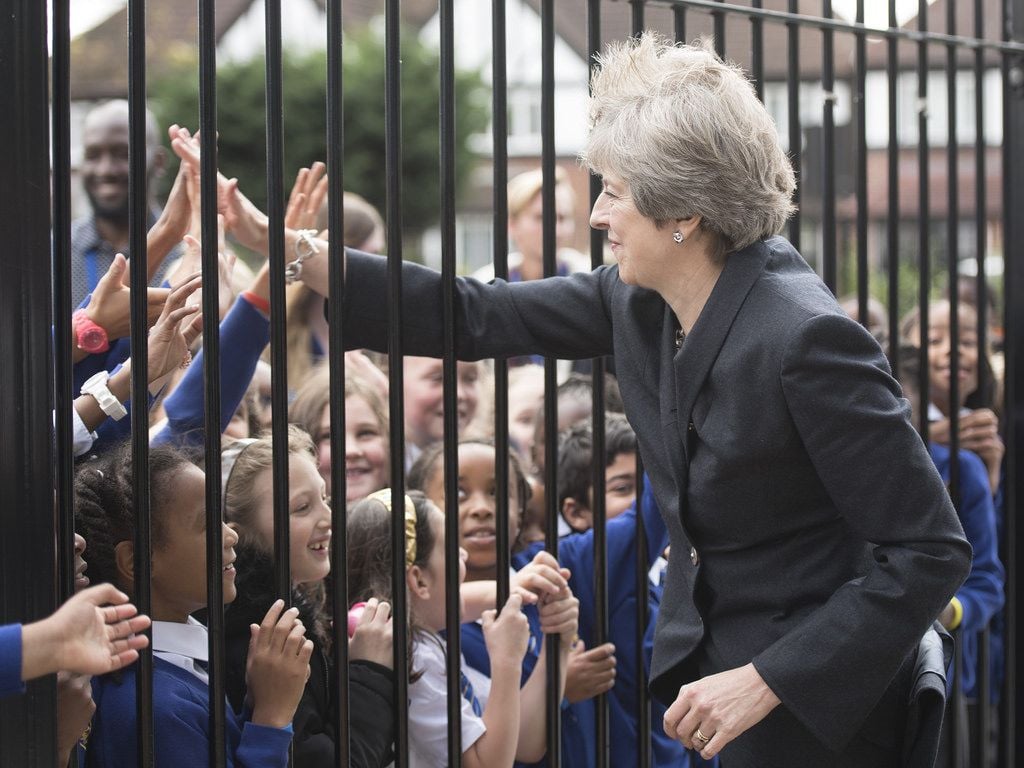Pound / Euro Exchange Rate Going Higher this Spring say Credit Suisse as Political Risk-Reward Looks Favourable
- Written by: James Skinner
- Conservatives could do better than expected at local elections
- For Sterling, political risk/reward ratio is favourable
- Bank of England, Brexit narrative to support British Pound

© Lee Goddard / Number 10 Downing Street
The British Pound buys 1.1469 Euros on the inter-bank market at the time of writing, this is more-or-less similar to the buying power seen at the same time yesterday, the week's current high is at 1.1476 which also represents the March high.
But, a stronger Pound could lie ahead we are told and this spring could see Pound Sterling rise and challenge its highest levels against the Euro since the Brexit vote of 2016, according to strategists at investment bank Credit Suisse.
Analysts are confident enough in this scenario unfolding to make selling EUR/GBP a 'top trade' for the second quarter of 2018. Betting on a rise in Pound Sterling earns 'top trade' status thanks to a favourable alignment of Brexit-related news and supportive UK economic fundamentals.
“The rationale for the view is that the recent Brexit agreement with the EU has significantly undermined the likelihood of a “no deal” outcome, and is supported by a hawkish BOE and still inexpensive GBP valuation,” says Nimrod Mevorach, a currency strategist with Credit Suisse.
With British and European Union negotiators striking an agreement to preserve the status quo for 21 months after the UK is due to leave the EU in March 2019, markets have become more sanguine about the perceived risks of Britain’s departure from the block. This means that even if the final “deal” were not a favourable one for the UK, the day of reckoning anticipated by many pundits has effectively been kicked into the long grass.
Against this backdrop of more benign political risk, the Bank of England has grown more intolerant of above-target inflation and fearful of the boost that rising wages might deliver to the consumer price index. It said back in February that it will raise interest rates faster than it previously suggested if consumer price pressures evolve in line with the Bank’s latest set of forecasts.
“As for policy, inflation dynamics in the UK appear to be on an idiosyncratic path relative the rest of G10, which suggests the BOE might be less likely to ditch its hawkish bias than other central banks if risk appetite deteriorates further at the global level,” Mevorach adds.
UK inflation recently fell from 3% to 2.7% but the BoE predicts it will remain above the 2% target until at least the end of the first quarter 2021, which means it is unlikely to be deterred from raising rates again over the coming months. As is always the case, rising interest rates are a powerful lure for international investors and short term speculators who would have to buy the Pound in order to benefit from improving returns on UK assets.
Pricing in interest rate derivatives markets, which enable investors to protect themselves against changes in interest rates while providing insights into expectations for monetary policy, implies a May 10 Bank Rate of 0.63% which suggests a greater than 50% probability of another rate hike next month. Any change in this implied probability between over the next six weeks will have an impact on Sterling.
In addition, if markets were to become more confident about betting on a second possible interest rate rise toward the end of the year, then the Pound could experience a significant boost. Ultimately, whether this happens or not will depend on the BoE’s tone and guidance after its next meeting in May.
Political Risk-Reward is Right
And politics could go the way of the Pound.
“Local elections in May are likely to play a key role: with Labour outperforming in last year’s national vote and in recent polls, the risk/reward of positioning for a Tory upset is attractive in our view, especially now that the deal with the EU has drastically reduced the tail risk associated with the 'hard Brexit' Tories,” Mevorach adds.
With local government elections barely a month away and the UK government still badly damaged by policy missteps and its disastrous call for a snap election in June 2017, fears are that the fortunes of the opposition Labour Party are on the up.
The party has vied with the government for first place in opinion polls throughout much of the last year, although its openly socialist and communist-sympathising leader is viewed as an economic risk by markets so a Labour success in the May elections may well be an upset for the Pound.
“We think the implications of risk are rather limited as a strong vote for Labour might force Tories further away from aggressive Brexit proposals rather than towards them, and the distant timing of the next general elections (scheduled for 2022) should ensure a less than panicked response,” Mevorach counters, playing down the immediate risks to the Pound from a Labour victory next month.
Mevorach and the Credit Suisse team have recommended that clients sell the EUR/GBP exchange rate at around 0.8730, which is the same thing as betting on a rise in the Pound-to-Euro exchange rate from its current level of 1.1449.
They have called this idea one of their “top trades” for the Spring and are targeting a move down to 0.8400 for the EUR/GBP rate, which implies the Pound-to-Euro rate may rise as high as 1.1904 during the months ahead.
This would be close to the highest level seen by Sterling relative to the Euro since the Brexit vote of June 2016.
Advertisement
Get up to 5% more foreign exchange by using a specialist provider to get closer to the real market rate and avoid the gaping spreads charged by your bank when providing currency. Learn more here.




